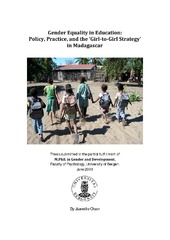| dc.contributor.author | Olsen, Jeanette | |
| dc.date.accessioned | 2009-10-22T11:32:25Z | |
| dc.date.available | 2009-10-22T11:32:25Z | |
| dc.date.issued | 2009-06-30 | eng |
| dc.date.submitted | 2009-06-30 | eng |
| dc.identifier.uri | https://hdl.handle.net/1956/3548 | |
| dc.description.abstract | This thesis is based on three months of field work in Morondava, Madagascar, and looks at efforts by global and national actors to achieve gender equality in education. These efforts are exemplified by the Girl-to-Girl Strategy, a UNICEF/UNGEI-initiated peer mentoring strategy. I place the strategy in the global education policy landscape, where there exists a large variety of actors and approaches to gender equality in education. I argue that Malagasy education policies, such as the Madagascar Action Plan, have to be seen in light of the increasing globalization of social policy, which can lead to less national sovereignty in the policy making. Madagascar has had great progress in education the last ten years, and it is now one of the few countries in Africa South of Sahara which has enrollment rates close to 100 in primary school. Despite the apparent gender parity in enrollment, girls are disadvantaged due to heavy domestic burdens, poverty, and gender stereotypes in society, which may keep them from reaching their potential, either by continuing their schooling, getting paid jobs and/or acquiring political positions. The Girl-to-Girl Strategy targets girls in primary school who are vulnerable to drop-out and repetition. I show that the strategy changes from policy level to practice, and illustrate how some big sisters' make significant efforts in helping the young ones in and outside school. I ask whether the improvement of girls' education should be placed solely on the girls. By analyzing the strategy through different theoretical lenses, I show the potential and the limitations of the strategy. Through an instrumentalist approach to gender equality in education, the strategy can be considered successful because it can contribute to gender parity in school. The strategy can also possibly fulfill the right to education, but it is more uncertain whether it can contribute to the fulfillment of rights within and rights through education. Through a capability approach we can only predict the positive short-term benefits of the strategy, such as increased motivation and reason to value school. The accounts of the girls in Morondava show that they are more motivated to go to school than before, and their parents and teachers reported that the girls are cleaner and behave better. | en_US |
| dc.description.abstract | Oppgaven er basert på et tre måneder langt feltarbeid på Madagaskar, og ser på nasjonale og internasjonale tiltak for å forbedre likestilling i utdanning. Madagaskar har hatt stor forbedring i utdanningssektoren de siste 10 årene, og nesten alle barn blir skrevet inn på skolen når de er i skolealder, noe som er ganske unikt i Afrika sør for Sahara. Til tross for det tilsynelatende er likestilling i utdanning, i alle fall i følge statistikken, er jentene i en vanskeligere situasjon på grunn av stor arbeidsbyrde i hjemmet, fattigdom, og negative kjønnsstereotypier. Disse forholdene kan hindre dem i å realisere sitt potensial. Jeg vil også hevde at gassisk utdanningspolicy, som for eksempel Madagaskar Action Plan, må sees i lys av den økende globaliseringen av sosial policy, som gjør at stater ikke lenger utformer policy isolert fra den internasjonale settingen. Et eksempel på et tiltak fra internasjonale aktører for å forbedre jenters situasjon, er UNICEF/UNGEI's fadderstrategi Girl-to-Girl Strategy på Madagaskar, som retter seg mot jenter som er i fare for å måtte gå om igjen eller slutte på skolen. Jeg viser hvordan strategien endrer seg fra policy til praktisk nivå, og viser hvordan noen av fadderene gjør en stor innsats for de små jentene, både på skolen og i hjemmet. I oppgaven plasserer jeg strategien i det globale policylandskapet og ser den i forhold til tre vanlige teoretiske tilnærminger til likestilling i utdanning, kalt capabilities, rettighetsbasert og instrumentell tilnærming. Jeg vurderer strategiens potensial og begrensninger innen de ulike tilnærmingene. | en_US |
| dc.format.extent | 6555446 bytes | eng |
| dc.format.mimetype | application/pdf | eng |
| dc.language.iso | nob | eng |
| dc.publisher | The University of Bergen | eng |
| dc.subject | Madagascar | eng |
| dc.subject | Morondava | eng |
| dc.subject | Gender equality | eng |
| dc.subject | Education | eng |
| dc.subject | Girls | eng |
| dc.subject | Global social policy | eng |
| dc.subject | Girl-to-girl | eng |
| dc.subject | Strategy | eng |
| dc.subject | Instrumentalism | eng |
| dc.subject | Rights-based approach | eng |
| dc.title | Gender Equality in Education - Policy, Practice and the Girl-toGirl Strategy in Madagascar | eng |
| dc.type | Master thesis | |
| dc.rights.holder | Copyright the author. All rights reserved | |
| dc.rights.holder | The author | eng |
| dc.description.degree | Master of Philosophy in Gender and Development | |
| dc.description.localcode | GAD350 | |
| dc.description.localcode | MAPS-GAD | |
| dc.subject.nus | 739999 | eng |
| dc.subject.nsi | VDP::Samfunnsvitenskap: 200::Kvinne- og kjønnsstudier: 370 | nob |
| fs.subjectcode | GAD350 | |
